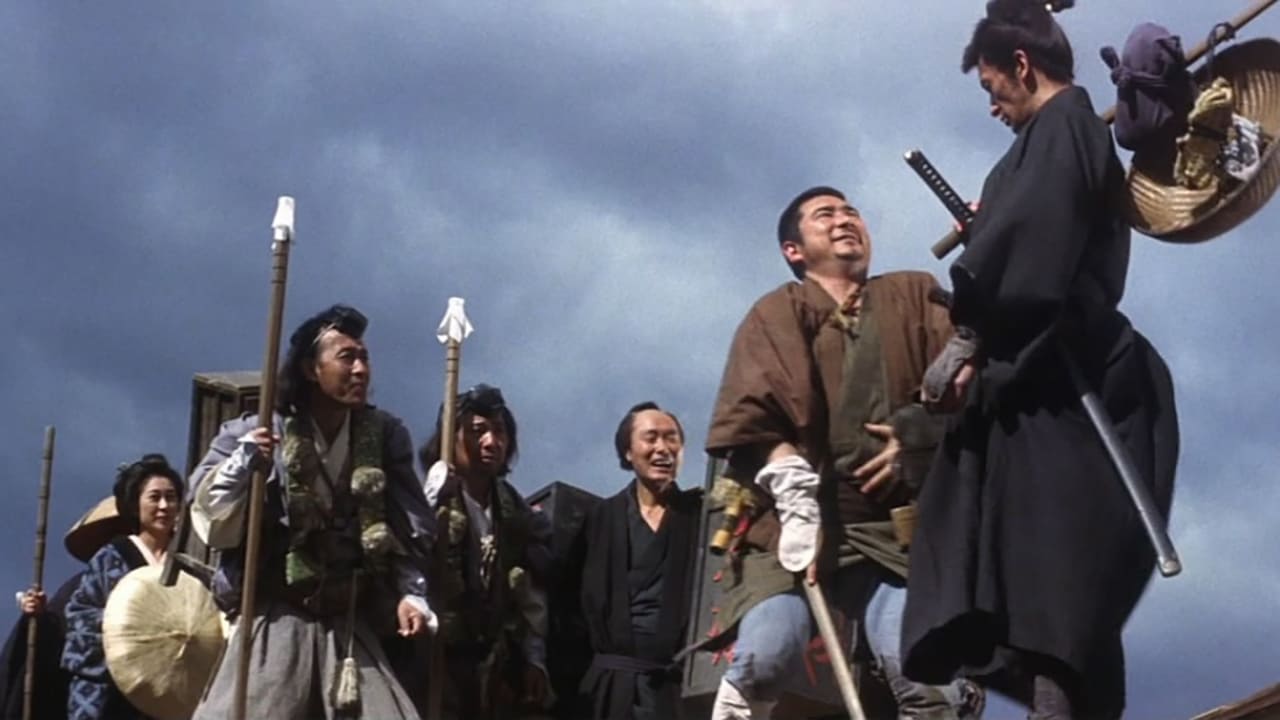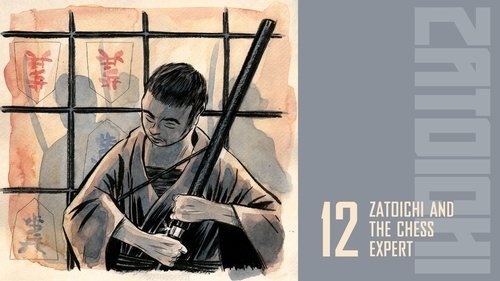


Zatoichi and the Chess Expert (Zatoichi #12), known under the more obscure title Showdown for Zatoichi (while the original title translates to something like Zatoichi's Infernal Journey) is director Kenji Misumi's third Zatoichi film and is often brought up by fans when discussing the best entries of the series. While I certainly understand why some people would think this was one of the better ones, I don't really hold it in much of a high regard, especially when compared to previous Misumi films.#12 doesn't throw a lot of its budget on action sequences, focusing instead on character-driven drama and suspense. The few action scenes we get sadly can't hold a candle to sword-fight choreography of previous installments, although the violence in #12 is a bit more brutal at some points. The characters are nothing new, really. There's the love interest, the endangered kid and the obligatory up-to-no-good ronin dressed all in black (the titular chess master). However, we do get an ass-kicking lady taking vengeance on the said ronin, and this isn't really the shiniest spot in Zatoichi's career either. His gambling streak oscillates and he is really clumsy in this movie.It is kinda refreshing that there is no criminal organization in cahoots with the officials this time, but the major problem of the film that it spends too much of its running time on numerous run-on-the-mill gambling scenes instead of developing the female samurai sub-plot. Also, the ending is rushed. So, so rushed. The only thing I got out of this movie is that chess figures had a very unimaginative design in feudal Japan.Highlight of the film would probably have to be Zatoichi's mini-speech on dirt: "The man you're looking at is dirt. And everyone who comes close to him or touches him, in one way or another gets muddied by that dirt. There's nothing I can do about being dirt myself, but I don't what you to get mired in my dirt."
... View MoreZatoichi films are all pretty similar. There are gambling (dice) scenes, Zatoichi vs. large gang fighting scenes, massaging scenes (usually of beautiful women), Zatoichi eating and drinking scenes, bath scenes, travel sequences, often a scenes with a child (or children) - and they all wonderful. One other consistent element is that they all are shot in glorious widescreen and contain some exquisite cinematography. I always find at least a couple of scenes in each film of this series to be quite breathtaking - certainly worthy of pondering over. I find these films so appealing regardless that I know exactly what is to come.In this chapter Zatoichi meets a rather confident and intelligent foe in the guise of a chess expert. This is, of course, after he has easily defeated all his lesser foes who seek vengeance on his gambling prowess (sound familiar?). We have a female love interest and Zatoichi spurning her because of his opinion of his own "lowlife" status. All in all I was more enthralled with the first 3/4's of this particular film, but felt it failed slightly at the end. Still I think the world of Zatoichi so I give this 4.5 /5
... View MoreGood combination of humor, action and a couple of twists (although if one watches enough of the Zatoichi movies, twists should be expected). I especially thought in this movie, Zatoichi came across more human and not just the guy that hides his cleverness through bumbling. Things to watch for: Zatoichi hustling the dice players but also failing at his own game, the battle in the swamp with his desperate search for the box of medicine and not one but two suspenseful battles at the end. His discussion with the chess expert on fighting was also insightful. There are swordfights and these last a little longer than the earlier movies but no geysers of blood or decapitated limbs so stay away if you are looking for that.
... View MoreThe state of blindness does not hinder the swordsman masseur, Zato Ichi, in this well-crafted tale of pre-modern Japan, as he is determined to do what is correct by assisting a young girl's recovery from a severe wound suffered in tangential fashion during a sword-fight involving gangsters in the bandit-ridden country. Of the approximately 25 Zato Ichi films, this must rank as one of the better ones, as Shintaro Katsu who portrays the sightless samurai during the entire series, permits us to see more of the inner man behind the warrior facade, aided by an interesting story written by Kan Shimozawa, who contributes the most complex scenarios of this group of works. In early civilized Japan, all masseurs were blind, as then they could not look upon the bodies of their clients, and Zato Ichi ("Ichi the Masseur") is following this tradition, but he is as well an inordinately successful warrior with his cane sword, mastering with cold aplomb each challenge by aggressors, no matter how many they might be. Ichi is a prototypical loner who makes his way in this work, as in all others, by massaging, while handsomely adding to his income through his cheating skills at gambling, since he is also an inveterate confidence man, yet one who makes mistakes and these errors in judgement serve in strengthening his accessibility to the viewer. There is a pleasingly intricate plot, which places Ichi as a travelling companion of an itinerant samurai named Jumonji, played well by Mikio Narita in his first cinematic role, who is the chess expert of the English language title, and the two interact with several other groups of characters in a neatly-woven narrative. The complicated scenario is capably handled by veteran director of samurai motion pictures, Kenji Misumi, who later added other outstanding Zato Ichi films to this first one in his list, as he balances the interwoven dramatics neatly and nicely. Reasons for the societal and artistic success of this series are manifest in this film, wherein Ichi represents values that most peoples are struggling to identify and capture, with the blind swordsman becoming an iconic figure as he stumbles and totters, rather than riding, into the sunset, after completing his clash with evil.
... View More